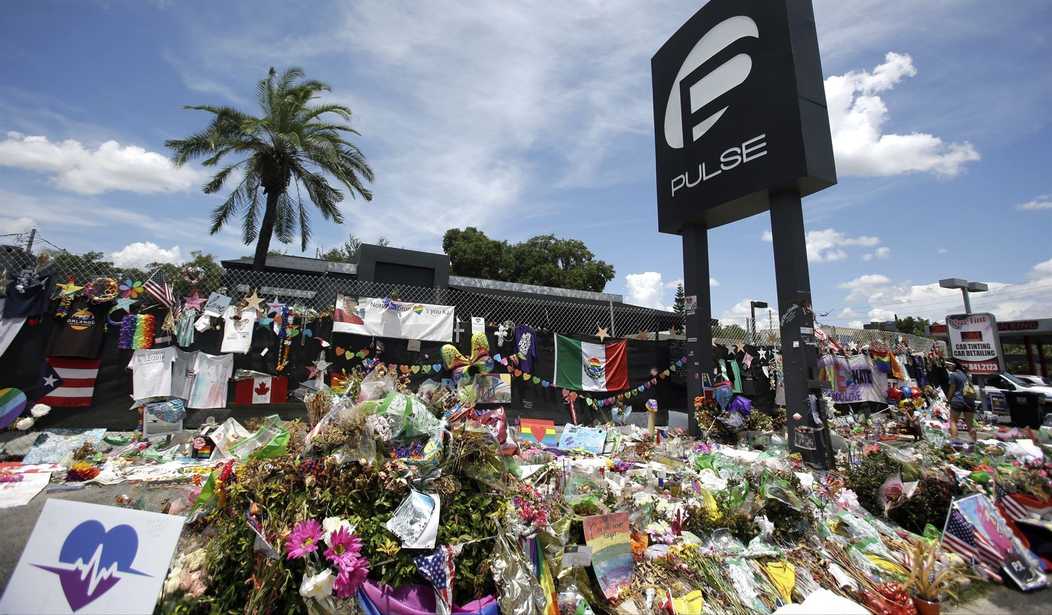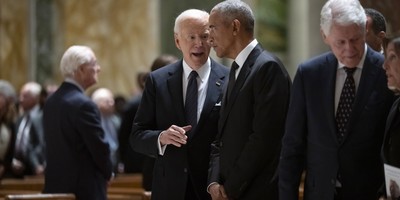Last week, Florida narrowly dodged a mass casualty terror attack when the FBI arrested a convicted jihadist who had recently completed a prison sentence and used his new freedom to plot.
The FBI’s May 23 arrest of Tampa resident and U.S. citizen Muhammed Momtaz Al-Azhari undoubtedly averted a terrible massacre, one he planned to model after the June 2016 Pulse Nightclub killing of 49 mostly gay patrons by his jihadist hero Omar Mateen.
But blood that is spared, just as much as blood actually spilled, should be sufficient to finally push Congress and the White House to address the recidivism threat posed by growing numbers of terrorist convicts re-entering society after serving their prison sentences. With hundreds of jihadists, white supremacists, and religious-hate extremists currently behind bars on less-than-life sentences, more Al-Azhari’s are on the way, and not all will be thwarted.
The blood-chilling FBI complaint painstakingly details how Al-Azhari was stockpiling firearms and other equipment for a terror attack he told various confidants “will get bloody” with the bodies of at least 50 Americans, probably on crowded beaches Al-Azhari had scouted in recent weeks. This should have come as no surprise to anyone; Al-Azhari spent three years in a Saudi Arabian prison on a 2015 conviction for planning to join terrorist groups fighting the Syrian government, possessing extremist propaganda and holding extremist views, the complaint said.
Upon his December 2018 release from prison by Saudi Arabia, Al-Azhari returned to Florida allegedly just as committed to mass-slaughter as when he departed.
Recommended
Talk of government action to tackle the recidivism threat briefly flared one year ago when the so-called “American Taliban” John Walker Lindh won early release from a 20-year prison sentence and re-entered society a free man reportedly still nursing hate. To date, the infamous Californian who took up arms for the Taliban and was captured on a smoking Afghanistan battlefield in 2001 hasn’t re-offended.
Fingers crossed on that.
But the storms of impeachment hearings and the COVID-19 pandemic drowned out most talk about addressing the putative threat posed by those released before and after Lindh.
Among measures that should be fast-tracked for consideration is a national terrorism offender’s registry, which some states are considering. Such a registry, like those that already exist for sex offenders, would enable communities where terrorist convicts live to see and report suspicious activities. Certain other collection measures are warranted as well for when murderous plans are not as detectable as Al-Azhari’s.
A Terror Convict Finally Free, Armed, and Bent on Mass Murder
For his attack, Al-Azhari wanted to kill more Floridians than did his idol Mateen at the Pulse Nightclub. He had intent and capability, with the guns and ammo he’d collected. Al-Azhari kept inspiration high from online ISIS propaganda and from visits to the Pulse memorial site (including a 2 a.m. drive-by last month, the time of Mateen’s attack). He scouted crowded beaches and other targets, such as a popular recreational foot path packed with COVID refugees.
“I want to take at least 50. You know like, brother Omar Mateen in Orlando did,” Al-Azhari told an FBI undercover informant. “He took 49 with him. He went in with AR-15 and 9mm, pow pow pow and won’t stop, just pulled the trigger – every kaffir he sees in front of him. That’s what I want to do, Inshallah (God willing).”
It remains unknown whether the FBI or any agency kept eyes on Al-Azhari after his December 2018 release or knew how hate-filled he still was after prison. The FBI complaint suggests Al-Azhari already had ammunition and guns well before informants, electronic surveillance, warrants for communications, and physical surveillance teams were brought to bear. In April 2020, Co-workers at a Tampa Home Depot reported Al-Azhari’s possession of firearms at work, interest in violent jihad and acquiring more weapons.
Former FBI Special Agent Gamal Abdel-Hafiz, stationed for two years in Saudi Arabia at the time of the 9/11 attacks, said the Saudis would have shared everything they knew about Al-Azhari with the bureau and CIA prior to imprisoning him and, significantly, after his release. Abdel-Hafiz also said the FBI undoubtedly would have monitored him closely after the Saudi release to see who he associated with and whether he might start down the jihadist path again.
“In this case, I’d give the bureau the benefit of the doubt,” Abdel-Hafiz said of his former agency. “If they didn’t watch him, I would be shocked. But shame on them if they didn’t follow him when he came back.”
At least from April forward, the FBI learned that his interest in violent jihad certainly survived his Saudi punishment. At one point during this spring’s investigation, Al-Azhari told an informant that he had supported ISIS efforts to establish an “Islamic state of Islam” for more than six years, which the FBI complaint noted “encompasses his time in Saudi Arabia.”
If the investigators weren’t sure how far over the edge he’d gone, they found what appeared to be martyr videos on Al-Azhari’s cell phone. In one, he sang as he brandished guns that he vowed “will be used against God’s enemies. I ask God the almighty to enable me and give me a duty that God will be happy with…”
A second in late April showed him wearing a face mask and holding an Uzi machine gun, addressing a faux group of victims. Speaking in English and in Arabic, he would order his putative victims, “Hey you, get on the floor. Don’t you move, don’t you move, I’m telling you, I will kill you, God willing, the exalted.”
Then, Al-Azhari looked directly into the camera and said “This is revenge for my brothers Al Muwahidden (the monotheists) in Guantanamo in general, and for my brother (redacted) in particular. This is a revenge for all my Muslim brothers in Iraq and al-Sham (Syria) and everywhere.”
After this, he points the gun at an imagined victim and says “God willing, the exalted, the Islamic State is lasting.”
A Broader New Homeland Security Policy Fix Extending to White Supremacists
Whether U.S. homeland security only became aware of Al-Azhari after he was locked, loaded and scouting targets goes to the heart of a threat issue first raised on a wide national scale with Lindh’s release a year ago.
For a short while, the Lindh release very publicly raised questions about how the country addresses terrorist recidivism risk. In a column, I answered that the United States does not track terrorist re-offense instances nor does the FBI systematically monitor most released terrorist convicts; they’re too busy prioritizing fresh pressing threats rather than ones already in the history books. From experience in counterterrorism intelligence, I opined that the United States is “pretty much at the mercy of formerly incarcerated terrorists.” I recommended three solutions to reduce this risk. One easy first step was a comprehensive government study to finally quantify how many terrorist recidivists – to include white supremacists and other hate-based domestic extremists – are in custody and how exactly they ended up back behind bars. Such a study would gauge the actual terrorism recidivism threat and guide other needed measures, such as using federal parole officers to collect intelligence during probation to flag trouble.
Of course, lesser-known terrorist convicts had been completing their terms for years already, drawing no special attention even when they recommitted terrorism crimes. There was Islamic State acolyte Elton Simpson of Phoenix. In 2010, he got three years’ probation for lying to FBI agents conducting a counterterror investigation into his plans to join the Somali terrorist group al-Shabaab. He went on to die at a defending police officer’s hand in a 2015 attack on a Prophet Muhammad cartoon exhibition in Garland, Texas.
There was Georgia resident Abdelghani Meskini, convicted as a co-conspirator in the December 1999 “Millennium Bombing” plot against LAX Airport. Five years after his 2005 release, he was re-incarcerated for buying an AK-47-style rifle after watching al-Qaeda propaganda and researching U.S. military installations as targets.
Al-Azhari joins them and others too numerous to detail here showing that prison and punishment does not always reform poisoned minds, and not just Islamists but animal rights and white nationalist extremists, too.
That’s a problem because more convicted terrorists get relatively short sentences and are getting out all the time. For an indication of how many, in 2017 George Washington University calculated that 450 people were incarcerated for terrorism-related crimes on terms that averaged 13 years, portending a steady drip of releases as sentences are served.
Efforts by groups were underway to persuade members of Congress to legislatively require homeland security agencies to tally terrorist recidivism in the United States and also require closer monitoring, especially during supervised probation terms under which most are required to behave.
Impeachment hearings and COVID-19 have knocked such efforts off track. Just three days before Al-Azhari was arrested, I participated in a Center for Security Policy webinar panel about why the country needs a national terrorism offender’s registry, which some states have proposed.
Al-Azhari’s thwarted attack should be enough to reboot a national discussion of pros and cons, then legislation. Hopefully, it won’t take bloodshed.
Follow Todd Bensman on Twitter @BensmanTodd

























Join the conversation as a VIP Member